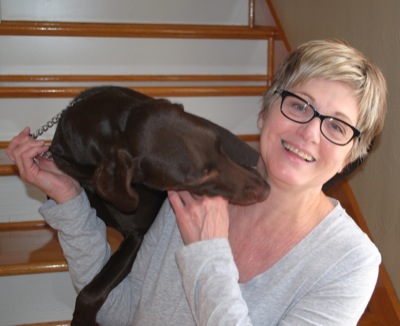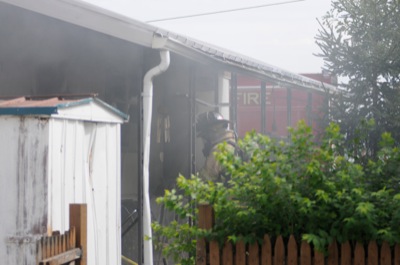Monday, September 16th, 2013
Celina woman blends love of dogs and veterans
By Eric Adams

Submitted Photo
Sandra Bohle's pet canine Abby, a rescued labrador and greyhound mix, largely inspired her to start the Angel Paws for Veterans service.
CELINA - A love for dogs and compassion for veterans spurred Sandra Bohle to start a program for military personnel with disabilities.
The Celina woman recently organized Angel Paws, which pairs veterans suffering post-traumatic stress disorder and other mental and physical conditions with service and companion dogs.
Bohle, who formerly worked as a job developer for the disabled, said her own labrador/greyhound mix dog, Abby, was her primary inspiration for the program. Abby is a rescue dog she was advised against adopting due to its sporadic personality and strong tendency to chase small animals.
The dog has since matured and grown to be a close, reliable companion. Abby's transformation resonated with Bohle because she knew many veterans' service dogs come from abusive homes or have behavior problems as pups, she said.
A crucial component of the program surfaced when she coincidentally met Cory Adkins - a Wright State University-Lake Campus sophomore - last year. The psychology student, who has worked with animal rescue programs since he was 13, trains the canines after foster homes are found.
Adkins teaches the dogs basic obedience and commands. Each animal requires a different approach, he said.
"It's really in-depth," Adkins said. "Training is all individualized, depending on the dog and veteran."
The trained dogs can serve veterans in a great number of areas, ranging from basic emotional support to helping around the house, he explained.
"If there's a loud, sudden noise, it can induce a lot of anxiety and cause a panic attack (for veterans)," Adkins said. "The dog can help bring them out of that."
Strategies the animals are trained to employ include licking and nudging the victim to reconnect them with reality. If a PTSD veteran experiences horrific flashback nightmares, the dogs are taught to hit an alarm or even flick a light switch, he said.
Adkins said canines can sense the initial onset of panic attacks because they have a strong sensitivity to twitches, changes in breathing and nervous "tics."
"They don't speak with words, they speak with body language; that's how they communicate with other dogs and with us," he said. "We're often telling them things that we don't even pick up on, especially with anxiety."
Other canine functions include object recognition and retrieval for veterans with limited mobility, Adkins said.
Tom Risch, veterans services coordinator for Mercer County, said the dogs also can provide a personal barrier in public. He explained that PTSD often causes extreme social anxiety, deterring many veterans from entering crowded places or even leaving the house.
"On the severe side, it's found these people have a very difficult time being around others," he said. "The dog will move between (the owner) and anyone who is approaching. It gives a sense of security."
While he has not worked personally with Angel Paws, Risch reported hearing positive remarks about similar programs across the nation.
To qualify for Angel Paws, veterans must be honorably discharged from military service and be able to provide documented medical proof that they suffer from a combat-induced medical condition, Bohle said. Interviews with potential candidates are then conducted and assessments made of the animal's prospective home.
"The dogs take a lot of training and time, and they're expensive," she said. "So we need to be good shepherds of the money that has been entrusted to us."
Bohle is seeking local foster families to house the dogs while they are trained and referred to a veteran; food and a cage for the animal are supplied via donation, she added.
She encourages interested veterans to contact her to see if they qualify as a recipient.
Angel Paws is a branch of Angels for Veterans, which Bohle founded in spring 2009. The Celina-based organization is funded by donations and provides area veterans with basic amenities such as clothing, gas cards and work readiness items, among numerous other types of support.


